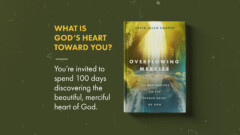If you’ve never read Lou Priolo’s Pleasing People, well, it’s a good thing to add to your list of things to do. The book takes aim at the human desire to orient our lives around pleasing people instead of first and foremost pleasing God.
In one of the chapters, Priolo looks at clothing ourselves in humility and here he offers some wisdom on the subject of forgiveness. As the father of three young children, and as the owner of a proud and sinful heart, I have endless opportunities to teach about forgiveness and to practice both forgiveness and repentance in my own life. I’ve had to tell my children that true repentance doesn’t involve the word “but” (“I’m sorry I smacked you but you shouldn’t have said that to me…”). But then I’ve seen that I can fall into the same sin. I’ve had to tell my children that true repentance doesn’t drag up the past and use forgiven sin against others. But then I’ve seen that I can do the same thing. Though I’m many years older than they are, the lessons about forgiveness are still coming.
In Pleasing People Priolo portrays the heart of forgiveness as being a promise. Here is what he says: “Forgiveness is fundamentally a promise. As God promises to not hold our sins against us, so we also must promise not to hold the sins of those we’ve forgiven against them.” This is, of course, the foundation of the forgiveness God promises to us: that He will never hold our sins against us. On the day of judgment we know that He will not suddenly charge us with sins that have been forgiven us through the blood of Jesus. We have faith in God and trust in this promise. Without this promise our faith is hopeless. Praise God that he offers us this manner of forgiveness!
The promise of forgiveness, says Priolo, can be broken into three parts. First, you promise not to bring up the offense to the forgiven person so as to use it against him. Second, you promise not to discuss with others the sin you have forgiven. Third, you promise not to dwell on the forgiven offense but to remind yourself that you have forgiven the offender in the same way that God has forgiven you for a multitude of far greater sins. Thus when you ask forgiveness you secure these promises for yourself.
Seeking forgiveness cannot be confused with apologizing. An apology is not the means to reconciliation (which is to say that “I’m sorry” and “Please forgive me” are not the same thing). If I apologize to a person I’ve offended and he subsequently apologizes to me, we still have not taken responsibility and truly humbled ourselves. We haven’t tied up loose ends and, to use Priolo’s term, the ball is still up in the air. Apologies are not enough. We must seek forgiveness and its fruit–reconciliation.
According to Priolo, true forgiveness looks something like this:
- Acknowledge that you have sinned. Let the party you’ve offended know that you acknowledge wrongdoing. This is humbling but necessary. Acknowledge not only that you sin but that you have sinned against this person.
- Identify your sin by its specific biblical name. Do not simply acknowledge generic sin but acknowledge specific sin and call it by its biblical name (which keeps you from acknowledging something society may label as sin but the Bible does not). This ensures that you have thought deeply about your sin and have seen how it fits into what the Bible calls sin.
- Acknowledge the harm your offense caused. This is also humbling. You must acknowledge that your sin has had consequences and that you are owning up not only to the sin but also to the harmful consequences your sin brought about.
- Demonstrate repentance by identifying an alternative biblical behavior. Show that you have truly considered your sin by explaining what you should have done instead. Show what the appropriate alternative behavior would have been.
- Ask for forgiveness. This puts the onus on the offended party to accept your repentance and to extend forgiveness to you. It completes the reconciliation between the offender and the one who has been offended.
These are simple steps, to be sure, and even obvious ones, but serve to display and prove true humility and true repentance. They bring about true and lasting reconciliation–the kind of reconciliation we experience with our God despite far greater, far more grave, offenses.










